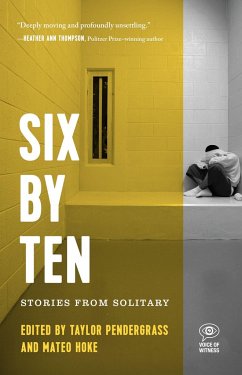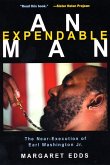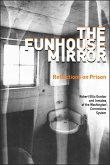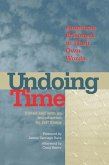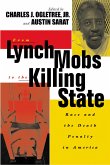Six by Ten
Stories from Solitary
Herausgeber: Pendergrass, Taylor; Hoke, Mateo
20,99 €
inkl. MwSt.
Versandfertig in über 4 Wochen

10 °P sammeln
Six by Ten
Stories from Solitary
Herausgeber: Pendergrass, Taylor; Hoke, Mateo
- Broschiertes Buch
- Merkliste
- Auf die Merkliste
- Bewerten Bewerten
- Teilen
- Produkt teilen
- Produkterinnerung
- Produkterinnerung
A collection of intimate portraits told directly by people whose lives have been devastated by solitary confinement in America.
Andere Kunden interessierten sich auch für
![Have a Seat, Please Have a Seat, Please]() Don ReidHave a Seat, Please19,99 €
Don ReidHave a Seat, Please19,99 €![An Expendable Man An Expendable Man]() Margaret EddsAn Expendable Man38,99 €
Margaret EddsAn Expendable Man38,99 €![There Is a Balm in Huntsville There Is a Balm in Huntsville]() T Carlos AndersonThere Is a Balm in Huntsville12,99 €
T Carlos AndersonThere Is a Balm in Huntsville12,99 €![The Funhouse Mirror The Funhouse Mirror]() Robert Ellis GordonThe Funhouse Mirror13,99 €
Robert Ellis GordonThe Funhouse Mirror13,99 €![Undoing Time Undoing Time]() Undoing Time31,99 €
Undoing Time31,99 €![From Lynch Mobs to the Killing State From Lynch Mobs to the Killing State]() From Lynch Mobs to the Killing State41,99 €
From Lynch Mobs to the Killing State41,99 €![Hidden Hands and Divided Landscapes Hidden Hands and Divided Landscapes]() Anoma PierisHidden Hands and Divided Landscapes29,99 €
Anoma PierisHidden Hands and Divided Landscapes29,99 €-
-
-
A collection of intimate portraits told directly by people whose lives have been devastated by solitary confinement in America.
Hinweis: Dieser Artikel kann nur an eine deutsche Lieferadresse ausgeliefert werden.
Hinweis: Dieser Artikel kann nur an eine deutsche Lieferadresse ausgeliefert werden.
Produktdetails
- Produktdetails
- Verlag: Haymarket Books
- Seitenzahl: 296
- Erscheinungstermin: 2. Oktober 2018
- Englisch
- Abmessung: 213mm x 140mm x 23mm
- Gewicht: 386g
- ISBN-13: 9781608469567
- ISBN-10: 1608469565
- Artikelnr.: 50910341
- Herstellerkennzeichnung
- Libri GmbH
- Europaallee 1
- 36244 Bad Hersfeld
- gpsr@libri.de
- Verlag: Haymarket Books
- Seitenzahl: 296
- Erscheinungstermin: 2. Oktober 2018
- Englisch
- Abmessung: 213mm x 140mm x 23mm
- Gewicht: 386g
- ISBN-13: 9781608469567
- ISBN-10: 1608469565
- Artikelnr.: 50910341
- Herstellerkennzeichnung
- Libri GmbH
- Europaallee 1
- 36244 Bad Hersfeld
- gpsr@libri.de
Taylor Pendergrass is a lawyer and activist focused on criminal justice reform. He currently works for the American Civil Liberties Union. Mateo Hoke is writer, journalist, and co-editor of Palestine Speaks: Narratives of Life Under Occupation.
INTRODUCTION by Taylor Pendergrass and Mateo Hoke
EDITORS’ NOTE: Ten Things to Know as You Read This Book
COFOUNDER AND EXECUTIVE EDITOR’S NOTE by Mimi Lok
NARRATORS:
Maryam Henderson-Ulohu (Louisiana)
“I was the only woman in the prison who was Muslim, the only one who wore a
headscarf.”
Brian Nelson (Illinois)
“There were times where I lost track of time. And I’m afraid of that
happening again.”
Aaron Lewis (Connecticut)
“They create this hardened person and then they release them to the
community, which is doomed for destruction.”
Vernesia Gordon (Alaska)
“They pepper-sprayed him through that slot in the door. You see these long
shots of pepper-spray going in.”
Mohammed “Mike” Iftiker Ali (California)
“In immigration detention, everybody was fighting for their lives but in
different ways. You knew you might not ever see your family again.”
Steve Blakeman (Washington)
“I think that mercy and justice in proper balance is the key.”
Candie Hailey (New York)
“If anybody wants to know what hell is, that’s what hell is.”
Shearod McFarland (Michigan)
“I had started to envision myself hanging from beams and having other
suicidal visions.”
Sonya Calico (Texas)
“It seemed like they had a rule that every time someone who’s transgender
goes in . . . they automatically go straight to solitary.”
Travis Trani (Colorado)
“How safe is that, really, to take somebody from twenty-three-hour-a-day
lockdown, and now he’s on the street corner in Denver, catching a bus with
civilians?”
Tonja Fenton (New York)
“I have developed zero tolerance for anything. I wasn’t like this before.”
Jason Mollino (California)
“Is it torture? I’d say yes because we crave human contact.”
Heather Chapman (Florida)
“They’re torturing my husband. They’re torturing me. They’re torturing my
daughters. They’re destroying our family.”
Michael “Zaharibu” Dorrough (California)
“I think that many of us reclaimed our humanity. Fighting back will do
that.”
APPENDIXES:
1. Timeline of Solitary Confinement in the United States
2. Glossary TK
III. Solitary as Violence (Title TK): essay by law professor Hope Metcalf
1. ACLU piece on current state of solitary policy and reform TK by Amy
Fettig
2. Five Demands of 2011 California Prisoner Hunger Strike
3. Ten Things You Can Do
VII. Q&A with mental health expert TK
ACKNOWLEDGMENTS
EDITORS’ NOTE: Ten Things to Know as You Read This Book
COFOUNDER AND EXECUTIVE EDITOR’S NOTE by Mimi Lok
NARRATORS:
Maryam Henderson-Ulohu (Louisiana)
“I was the only woman in the prison who was Muslim, the only one who wore a
headscarf.”
Brian Nelson (Illinois)
“There were times where I lost track of time. And I’m afraid of that
happening again.”
Aaron Lewis (Connecticut)
“They create this hardened person and then they release them to the
community, which is doomed for destruction.”
Vernesia Gordon (Alaska)
“They pepper-sprayed him through that slot in the door. You see these long
shots of pepper-spray going in.”
Mohammed “Mike” Iftiker Ali (California)
“In immigration detention, everybody was fighting for their lives but in
different ways. You knew you might not ever see your family again.”
Steve Blakeman (Washington)
“I think that mercy and justice in proper balance is the key.”
Candie Hailey (New York)
“If anybody wants to know what hell is, that’s what hell is.”
Shearod McFarland (Michigan)
“I had started to envision myself hanging from beams and having other
suicidal visions.”
Sonya Calico (Texas)
“It seemed like they had a rule that every time someone who’s transgender
goes in . . . they automatically go straight to solitary.”
Travis Trani (Colorado)
“How safe is that, really, to take somebody from twenty-three-hour-a-day
lockdown, and now he’s on the street corner in Denver, catching a bus with
civilians?”
Tonja Fenton (New York)
“I have developed zero tolerance for anything. I wasn’t like this before.”
Jason Mollino (California)
“Is it torture? I’d say yes because we crave human contact.”
Heather Chapman (Florida)
“They’re torturing my husband. They’re torturing me. They’re torturing my
daughters. They’re destroying our family.”
Michael “Zaharibu” Dorrough (California)
“I think that many of us reclaimed our humanity. Fighting back will do
that.”
APPENDIXES:
1. Timeline of Solitary Confinement in the United States
2. Glossary TK
III. Solitary as Violence (Title TK): essay by law professor Hope Metcalf
1. ACLU piece on current state of solitary policy and reform TK by Amy
Fettig
2. Five Demands of 2011 California Prisoner Hunger Strike
3. Ten Things You Can Do
VII. Q&A with mental health expert TK
ACKNOWLEDGMENTS
INTRODUCTION by Taylor Pendergrass and Mateo Hoke
EDITORS’ NOTE: Ten Things to Know as You Read This Book
COFOUNDER AND EXECUTIVE EDITOR’S NOTE by Mimi Lok
NARRATORS:
Maryam Henderson-Ulohu (Louisiana)
“I was the only woman in the prison who was Muslim, the only one who wore a
headscarf.”
Brian Nelson (Illinois)
“There were times where I lost track of time. And I’m afraid of that
happening again.”
Aaron Lewis (Connecticut)
“They create this hardened person and then they release them to the
community, which is doomed for destruction.”
Vernesia Gordon (Alaska)
“They pepper-sprayed him through that slot in the door. You see these long
shots of pepper-spray going in.”
Mohammed “Mike” Iftiker Ali (California)
“In immigration detention, everybody was fighting for their lives but in
different ways. You knew you might not ever see your family again.”
Steve Blakeman (Washington)
“I think that mercy and justice in proper balance is the key.”
Candie Hailey (New York)
“If anybody wants to know what hell is, that’s what hell is.”
Shearod McFarland (Michigan)
“I had started to envision myself hanging from beams and having other
suicidal visions.”
Sonya Calico (Texas)
“It seemed like they had a rule that every time someone who’s transgender
goes in . . . they automatically go straight to solitary.”
Travis Trani (Colorado)
“How safe is that, really, to take somebody from twenty-three-hour-a-day
lockdown, and now he’s on the street corner in Denver, catching a bus with
civilians?”
Tonja Fenton (New York)
“I have developed zero tolerance for anything. I wasn’t like this before.”
Jason Mollino (California)
“Is it torture? I’d say yes because we crave human contact.”
Heather Chapman (Florida)
“They’re torturing my husband. They’re torturing me. They’re torturing my
daughters. They’re destroying our family.”
Michael “Zaharibu” Dorrough (California)
“I think that many of us reclaimed our humanity. Fighting back will do
that.”
APPENDIXES:
1. Timeline of Solitary Confinement in the United States
2. Glossary TK
III. Solitary as Violence (Title TK): essay by law professor Hope Metcalf
1. ACLU piece on current state of solitary policy and reform TK by Amy
Fettig
2. Five Demands of 2011 California Prisoner Hunger Strike
3. Ten Things You Can Do
VII. Q&A with mental health expert TK
ACKNOWLEDGMENTS
EDITORS’ NOTE: Ten Things to Know as You Read This Book
COFOUNDER AND EXECUTIVE EDITOR’S NOTE by Mimi Lok
NARRATORS:
Maryam Henderson-Ulohu (Louisiana)
“I was the only woman in the prison who was Muslim, the only one who wore a
headscarf.”
Brian Nelson (Illinois)
“There were times where I lost track of time. And I’m afraid of that
happening again.”
Aaron Lewis (Connecticut)
“They create this hardened person and then they release them to the
community, which is doomed for destruction.”
Vernesia Gordon (Alaska)
“They pepper-sprayed him through that slot in the door. You see these long
shots of pepper-spray going in.”
Mohammed “Mike” Iftiker Ali (California)
“In immigration detention, everybody was fighting for their lives but in
different ways. You knew you might not ever see your family again.”
Steve Blakeman (Washington)
“I think that mercy and justice in proper balance is the key.”
Candie Hailey (New York)
“If anybody wants to know what hell is, that’s what hell is.”
Shearod McFarland (Michigan)
“I had started to envision myself hanging from beams and having other
suicidal visions.”
Sonya Calico (Texas)
“It seemed like they had a rule that every time someone who’s transgender
goes in . . . they automatically go straight to solitary.”
Travis Trani (Colorado)
“How safe is that, really, to take somebody from twenty-three-hour-a-day
lockdown, and now he’s on the street corner in Denver, catching a bus with
civilians?”
Tonja Fenton (New York)
“I have developed zero tolerance for anything. I wasn’t like this before.”
Jason Mollino (California)
“Is it torture? I’d say yes because we crave human contact.”
Heather Chapman (Florida)
“They’re torturing my husband. They’re torturing me. They’re torturing my
daughters. They’re destroying our family.”
Michael “Zaharibu” Dorrough (California)
“I think that many of us reclaimed our humanity. Fighting back will do
that.”
APPENDIXES:
1. Timeline of Solitary Confinement in the United States
2. Glossary TK
III. Solitary as Violence (Title TK): essay by law professor Hope Metcalf
1. ACLU piece on current state of solitary policy and reform TK by Amy
Fettig
2. Five Demands of 2011 California Prisoner Hunger Strike
3. Ten Things You Can Do
VII. Q&A with mental health expert TK
ACKNOWLEDGMENTS
